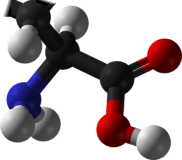D-amino acid

Amino acids are chiral compounds that are present in living organisms as free compounds or as polymers such as peptides or proteins. The 20 L-Amino acids present in proteins and peptides are defined as proteinogenic amino acid. About 500 amino acids are known and have been classified in many ways base on their chemical/physical properties.[1]
All α-amino acids (AA) but glycine exist in either of the two enantiomers, which are mirror images of each other (the so called D- and L-enantiomers).
Although present in a less concentration in mammals, free D-amino acids play central roles: as an example D-serine is one of the main neuromodulators of the glutamatergic neurotransmission and D-aspartate is fundamental for brain development in fetus. [2] [3]
Bacteria: The major sources of D-amino acids in Nature are bacteria. In these microorganisms, D-amino acids are part of peptidoglycan (a major component of the bacterial cell wall). In addition, also the compounds teichoic acids and poly-γ-glutamate contain D-amino acids.
In peptidoglycan, D-alanine or D-glutamate contribute to antibiotic resistance in some bacteria. Many diverse bacteria synthesize D-amino acids such as, D-methionine and D-leucine.
D-amino acids are also present in many venoms from platypus, funnel web spider, and cone snail produced by the action of isomerases. [4]
References
- ↑ Wagner I, Musso H (November 1983). "New Naturally Occurring Amino Acids". Angewandte Chemie International Edition in English. 22 (11): 816–28. doi:10.1002/anie.198308161.

- ↑ Katane M, Homma H (Jun 2010). "D-aspartate oxidase: the sole catabolic enzyme acting on free D-aspartate in mammals.". Chem Biodivers. 7 (6): 1435–49. doi:10.1002/cbdv.200900250. PMID 20564562.
- ↑ Mothet JP, Parent AT, Wolosker H, Brady RO, Linden DJ, Ferris CD, Rogawski MA, Snyder SH (Apr 2000). "D-serine is an endogenous ligand for the glycine site of the N-methyl-D-aspartate receptor.". Proceedings of the National Academy of Sciences of the United States of America. 97 (9): 4926–31. Bibcode:2000PNAS...97.4926M. doi:10.1073/pnas.97.9.4926. PMC 18334
 . PMID 10781100.
. PMID 10781100. - ↑ Radkov AD, Moe LA (2014). "Bacterial synthesis of D-amino acids.". Appl Microbiol Biotechnol. 98: 5363–74. doi:10.1007/s00253-014-5726-3.
External links
